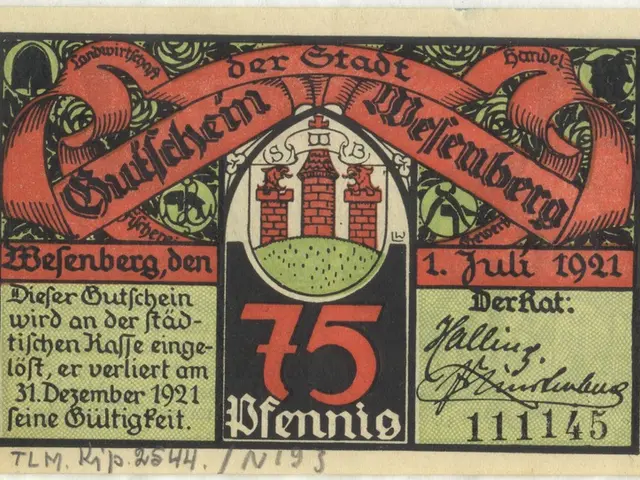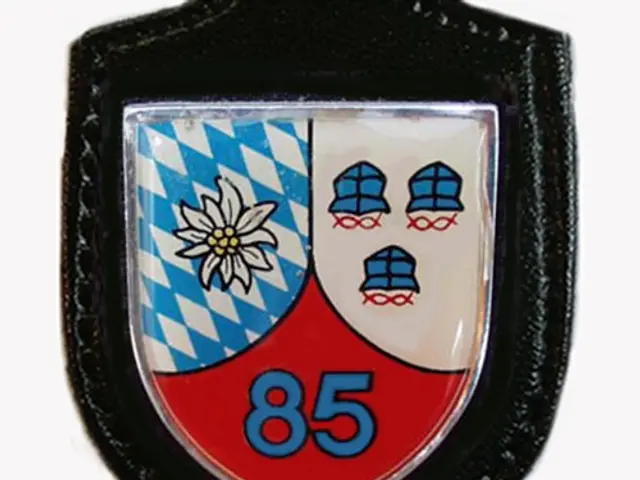Students in Germany Display Nazi Salute at Auschwitz for Instagram Post
Taking a Stroll Through Dark History: The Auschwitz Spray-Tan Scandal
High school students from Germany made waves on social media after they snapped a selfie while channeling their inner Adolf at the Auschwitz-Birkenau concentration camp. The students, hailing from the Scultetus School in Görlitz, were caught flaunting the "White Power" gesture, a symbol synonymous with white supremacist ideology.
This photo Opportunity, taken on March 13, 2025, generated outrage across the net like a wildfire. The pic showed the students grinning from ear to ear, with their arms outstretched in the infamous neo-Nazi position, right in front of the former concentration camp.
Who Lost Their Cool?
News of the incident reached Polish outlet TVN24 and the German news agency dpa. The guilty parties were soon identified as four upper-school students from the Scultetus School. These little darlings of fascism wanted to play dress-up, and the concentration camp was their runway.
The students didn't stop there. Upping the ante, they took the offensive and posted the embarrassing picture on Instagram. The result? Widespread backlash after it went viral across various social media platforms. Eventually, German media caught wind of it, including Bild, kicking off a public uproar.
The School's Response
The Saxon Education Authority wasted no time in addressing the incident. Spokespersons confirmed the students' faux pas and revealed that the school management swiftly organized meetings with the students and their parents to discuss the matter. The students were disciplined, as they received official reprimands and were assigned community service at sheltered workshops.
While the gesture itself isn't punishable under German law, using it, especially at a site commemorating the victims of the Holocaust, was considered "absolutely unacceptable." Education officials emphasized that freedom of speech doesn't mean freedom to act rude, disrespectful, and disregardful towards humanity's most tragic memories.
The Dresden Machinists
The incident didn't slip past the Dresden-based anti-fascist group Antifa Elbflorenz. They raised the alarm, investigating the matter and declaring the students' behavior a troubling sign of growing youth radicalization in eastern Germany.
"This incident is a grim portent of the deep-rooted neo-Nazism festering in Saxony," said the group in its statement. "Auschwitz is a solemn reminder of the atrocities committed during the Holocaust - it's not a playground for radicals or a backdrop for ignorant idiocy."
Say It With a Song
The Auschwitz scandal isn't the only recent example of schoolchildren dabbling in hate speech. Just recently, pupils from Bielefeld, western Germany, were accused of breaking out into a racist tune after a trip to the Bergen-Belsen concentration camp memorial. Witnesses reported hearing students crooning chants like "Germany is for Germans, foreigners out," a phrase notorious for its links to far-right groups.
Experts are concerned about the persistence of far-right ideologies in Germany, particularly in eastern regions. They warn that despite extensive Holocaust education efforts, bigotry continues to appeal to some young minds.
Silence from the Grave
The Auschwitz-Birkenau State Museum has remained quiet on the matter, choosing to refrain from public comment. However, museum officials have long emphasized the importance of using the site to educate visitors about the Holocaust, human rights, and the dangers of hate-driven ideologies.
Auschwitz remains a potent symbol of the Holocaust, having witnessed the murder of over 1.1 million people, mostly Jews, at the hands of Nazi Germany during World War II. The site draws more than two million visitors annually, a majority made up of school groups from Germany and around the world.
Polish Outrage
In Poland, the incident sparked anger and bewilderment.
"This is beyond belief," said Marek Kozlowski, a kraków-based historian. "The gall of utilizing the grounds of Auschwitz as a backdrop for such a vile act, and then broadcasting it for all to see, demonstrates a shocking disregard for the solemnity of the site - not to mention the memory of its victims."
Germany's Rearview Mirror
The Auschwitz scandal has reignited a debate in Germany about the effectiveness of Holocaust education and how best to mitigate rising far-right sentiment among the youth.
Authorities in Saxony vowed to take the issue seriously and affirmed their dedication to combating racism and extremism. "We refuse to tolerate such behaviour," the Education Authority announced. "To ensure our young people understand history's lessons and the importance of respecting the memory of its victims, we must work tirelessly."
Want to stay updated on the latest news from Poland? Sign up for our weekly newsletter, hitting your inbox every Saturday.
We swear, we don't spam! 😉 😉
Keep your eyes peeled for that first few emails, just in case they wind up lost in your spam folder. 😉 😉
- The selfie incident at Auschwitz-Birkenau, involving students from the Scultetus School in Görlitz, Germany, was widely covered by media outlets such as TVN24 and dpa.
- These students faced backlash not only on social media platforms like Instagram but also from German newspapers like Bild.
- The Saxon Education Authority took swift action against the students, conducting meetings with the students and their parents to address the incident.
- The authorities emphasized that freedom of speech does not mean acting in a disrespectful or disregardful manner, especially towards the memory of the Holocaust.
- Anti-fascist group Antifa Elbflorenz raised concerns about the incident, viewing it as a troubling sign of youth radicalization in eastern Germany.
- The Auschwitz-Birkenau State Museum remained silent on the matter but has long emphasized the importance of education about the Holocaust at the site.
- The incident sparked outrage in Poland, with historians expressing shock and disbelief over the students' actions.
- The scandal has reignited a debate in Germany about the effectiveness of Holocaust education and the importance of combating racism and extremism among the youth.
- While the gesture itself might not be punishable under German law, it is considered absolutely unacceptable, especially at a site like Auschwitz that commemorates the victims of the Holocaust.










